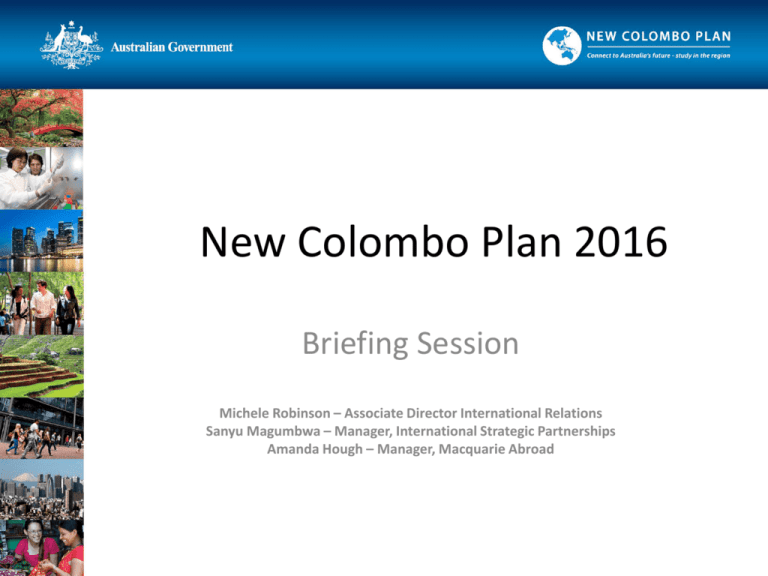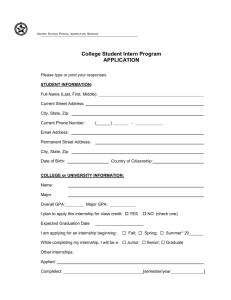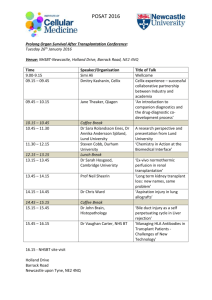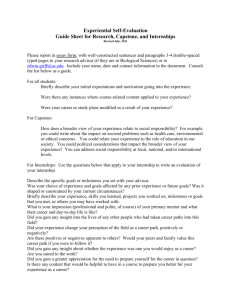New Colombo Plan Briefing Presentation
advertisement

New Colombo Plan 2016 Briefing Session Michele Robinson – Associate Director International Relations Sanyu Magumbwa – Manager, International Strategic Partnerships Amanda Hough – Manager, Macquarie Abroad In this session NCP 2016 – overview Key aspects of the program Funding: Mobility Grants Maxmise your chances Examples of successful 2015 projects Selection and assessment processes (internal and external) To provide next steps New Colombo Plan 2016 NCP provides funding for Australian universities to provide grants to: 18-28 year old; Australian; Undergraduate students to participate in semester-based or short-term experiences in the Indo-Pacific region Staff apply for a student cohort-based programs; o Semester-based study o Short-term study o Practicums / clinical placements o Internships and mentorships o Short-term research Each project MUST provide Students with academic credit OR be a mandatory component of the participants’ course Destinations 2016 Project Destinations include: Bangladesh, Bhutan, Brunei Darussalam, Burma, Cambodia, China, Cook Islands, Federated States of Micronesia, Fiji, Hong Kong SAR, India, Indonesia, Japan, Kiribati, Laos, Malaysia, Maldives, Marshall Islands, Mongolia, Nauru, Nepal, Niue, Pakistan, Palau, Papua New Guinea, Philippines, Republic of Korea, Samoa, Singapore, Solomon Islands, Sri Lanka, Taiwan, Thailand, Timor-Leste, Tonga, Tuvalu, Vanuatu and Vietnam What we know to date $25m applied, of $8m available in 2015, with $10m awarded Now $20m available 2016 round Universities will be asked to submit one application per project i.e. if a university would like to apply for 2 projects in India, 3 in Indonesia and 2 in Thailand, it will submit 7 applications Awarding ratio of 70:30 removed (a strong preference for semester based study periods) What we know to date Multi-year funding is available for mobility projects that may run for up to three years The selection criteria have been further refined to encourage applications that align to the greatest extent with NCP strategic objectives *Projects that support semester study, internships, language acquisition will be prioritised Additional weighting will also be available to projects that attract private sector in-kind or financial sponsorship Funding: Mobility Grants NCP Short-term grant For mobility that is less than 6 months in duration Provided at a rate of between $1,000 and $3,000 per student NCP Semester grant For study of at least one Study Period, but up to 12 months in duration A Study Period can be a semester or a trimester. Provided at a rate of between $3,000 and $7,000 per student NCP mobility grant is paid directly to the students Funding: Mobility Grants Internship grant Provided at a rate of $1,000 per grant The internship must be part of a semester Mobility Project to receive this grant The additional internship component may be (but does not have to be) for additional credit or a mandatory component of the student’s course • Administration funding may be used to subsidise the costs associated with Mobility Project administration, including, but not limited to: - arranging, negotiating and researching details of Mobility Project - Supervising, monitoring and evaluating students’ progress during the Mobility Project - Engaging the services of third party organisations which have the relevant expertise to support students to undertake Mobility Projects - General administration costs What you need to know Prioritisation of projects that: o meet all or a majority of NCP strategic objectives; support new mobility, strengthen partnerships, facilitate longer-term study, language study, and internships o attract private sector in-kind or financial sponsorship (that goes beyond the provision of internships), to encourage collaboration between universities and the private sector New eligibility criteria and selection criteria to reflect the above changes Weighting scale against each criteria Maximising your chances Discipline • A diverse spread is encouraged; no specific priorities Duration • Preference in the long-term is for semester projects; however we (and DFAT) recognise that this may not be achievable straightaway, and that short-term options may be the most viable program type to mobilise students New and innovative projects • Existing projects will be considered. However new and innovative projects will be highly regarded. The Government has committed funding until 2017/18 and has had some discussion for multi-year projects in future rounds Internship/mentorships • Projects with an internship/mentorship component will be highly regarded. Faculties will be encouraged to use their links within universities or internship providers to arrange these opportunities. Examples of eligible programs The University of Melbourne: The University of South Pacific, Cook Islands. (Music) Over ten days students will collaborate in combined teams to create audio compositions. The musical pieces will explore issues of sustainability, climate change, cultural context, site, history, community and topography. Monash University: Ministry of Education and participating schools, Malaysia. (Education) Students will undertake a 15 day pre-service practicum in Kuala Lumpur or the surrounding areas. Placements will include Early Childhood, Primary and High Schools The University of Western Australia: Temasek Polytechnic, Singapore. (Media, Communications) Students will complete a three week intensive course in television and video production. Students will focus on the diversity of Singapore's society and politics. The intensive forms part of a reciprocal arrangement which will see Singaporean students completing a course in Australia. Examples of eligible programs RMIT: Suranaree University of Technology and Western Digital Thailand, Thailand. (Engineering) One to two semesters of study at partner institute, followed by an internship at Western Digital Thailand. Griffith University: Qingdao University, China. (Business) GBS Global Mobility Internship: Students will travel to Beijing during the summer of 2015-16 to complete one of two intensive mode courses in 'Business Chinese' or 'China Today Tradition and Modernisation' at Peking University, and then complete a five to six week full-time internship in Beijing in a business discipline area aligned to their degree program. University of New South Wales: BINUS University, Institut Teknolohi Bandung, Sekolah Tinggi Seni, Universitas Airlangga, Universitas Kristen Duta Wacana, Indonesia. (Multi Discipline) Students will study in Indonesia under the newly-established UNSW NCP Indonesia Ambassadors Project, supporting a range of faculty-led study tours to Indonesia. The Application Criteria Selection Criteria 1. Support increased student mobility that lifts knowledge of the Indo-Pacific in Australia (200 words; 40% weighting) 2. Support for new and/or strengthened partnerships (150 words; 30%) 3. Promote the New Colombo Plan, study and Internships in the Indo-Pacific region (100 words; 10% per cent weighting) 4. Support for semester-based study opportunities in the Indo-Pacific (5% per cent weighting; Yes/No) NB. Short-term projects cannot respond “Yes” to this criterion. For short-term projects this criterion is pre-filled 5. Support for language acquisition (5 per cent weighting; Yes/No) 6. Support for Internships in the Indo-Pacific (5% per cent weighting; Yes/No) Internship, clinical placement or practicum. 7. Private sector sponsorship of the New Colombo Plan (5% per cent weighting; Yes/No) The Application Process 1. Internal Process – Unit and Faculty to determine internally their approach to write and collate the proposals (Cross-faculty collaboration is encouraged) 2. International Committee – Review of applications; ranking countries against NCP criteria and MQ International Strategy - and where multiple projects for a country are submitted, further priority ranking applies 3. Submission – One MQ University submission Timeline The table below summarises key dates for the 2016 round: 2 April 2015 Applications available and the 2016 round opens 5 June 2015 Application 2016 round closes June – August 2015 Applications assessed and reviewed August 2015 Applicants notified of outcomes and funding offers made to successful Applicants Project Schedules and invoices due 4 weeks after offers are made September 2015 Grants published on the Department of Foreign Affairs and Trade website (www.dfat.gov.au/about-us/grants-tenders-funding) 14 working days after the Funding Recipient has submitted the signed project schedule and invoice Next Steps Staff to identify units / programs that align to the objectives of the New Colombo Plan Staff to also consider academic or research links that could benefit from NCP Draft application and submit to relevant contact eg. Associate Dean International, Head of Department etc. Receive communication from International Relations office regarding internal timeline





